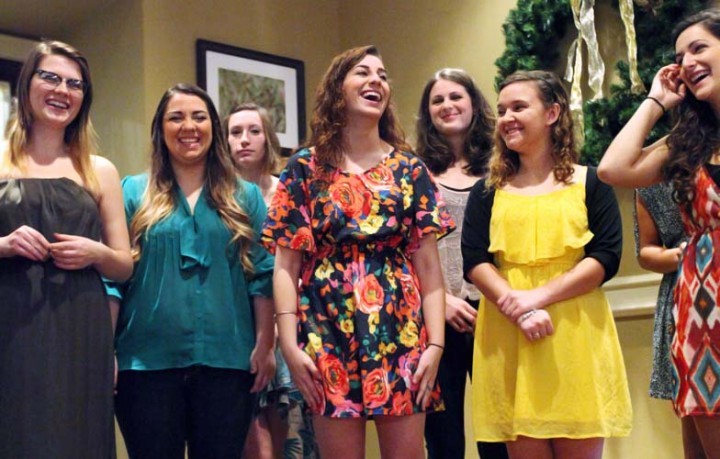VERO BEACH — Tatiana Penagos came home from college last week bearing a living thank-you note.
A caravan of college girls from her Tallahassee a capella group arrived at Grand Harbor to perform for providers of Penagos’ four-year scholarship.
The Indian River Symphonic Association’s music scholarship program has helped 14 local college students like Penagos, majoring in music or a related field – she is studying music therapy.
The program, begun in 2005, doubled this year with the addition of a second four-year scholarship. That means a scholarship will now be awarded every two years instead of every four.
“We would love to be able to fund two more, if we don’t have any more unpleasant surprises like the market crash in ’08,” says IRSA’s Patricia Sawyer, chairwoman of the scholar ship committee.
As of this year, IRSA has invested $100,000 in endowments for need-based scholarships administered through the Dollars for Scholars program. It has given away another $25,000 in one-time scholarships not based on financial need.
The scholarships are funded through leftover ticket revenue plus donations included when patrons mail in their checks for season subscriptions.
For 18 years, IRSA has regularly hosted the Brevard Symphony Orchestra in Vero performances at the Community Church. It also brings in national and international orchestras on tour.
“We have to consider covering the cost of the orchestras that we bring down. To the extent that we cover that and we have excess funds, we keep that in an account.”
While money for scholarships has accrued, Sawyer says there are more unsold season tickets than in the past. Ironically, that can be good news for music lovers new to the area.
“There used to be a very long waiting list,” says Sawyer. “When I first moved here in the 1990s, I waited years to get a subscription. Now we have a population that is older. Some can’t drive at night, or are just not able to attend anymore. And with the economy, they think twice about how to spend their entertainment dollars.”
She says there are tickets available for all the concerts in the series, though the Jan. 25 performance of the China National Symphony Orchestra with violinist Chuanyun Li is getting close to selling out, she says.
Season tickets are advantageous for two reasons: first, concerts average out to a lower cost. And second, people get to claim the same seat they had last year. Over time, she says, that builds up a sense of camaraderie by placing patrons near each other season after season.
“We keep about a hundred seats for each performance for single-ticket sales. They tend to be further to the back of the auditorium and sometimes a little more on the sides. Still, they are excellent seats compared to Kravis or Carnegie Hall.”
Penagos, a graduate of Indian River Charter High School, receives $1,500 a semester for four years from the IRSA endowed scholarship.
In Penagos’ case, it made the difference as to whether she could even go to college.
She combined it with another Dollars for Scholars scholarship and one from PNC Bank’s Friend Fund. She is also a recipient of Florida’s Bright Futures scholarship for high-achieving students.
In addition, the symphonic association gives one-time scholarships not based on financial need. They are in varying amounts.
“Last year we had about $10,000 that we awarded to six students,” says Sawyer. “The awards vary and the committee decides how much to award each student. Last year we happened to have a lot of excellent applications and that amounted to a lot of awards.”
Streaming into a back lounge area of Grand Harbor’s clubhouse Wednesday morning, the dozen singers that call themselves the Acabelles crowded into a corner as IRSA board members and patrons, seated at tables, looked up from their coffee cups.
If they were expecting Yale’s Whiffenpoofs circa 1950, what they got was today’s pop and hip-hop, arranged into something more like soulful, exquisitely executed choir music.
The Acabelles are one of only a handful of all-female collegiate a capella groups, which have soared in number on college campuses since the early 2000s.
Isabella Senzamici, an alto, is also the FSU group’s vocal percussionist, setting the rhythm at the start.
“It’s basically beatboxing,” she said by way of introduction, flummoxing the mostly senior audience with the contemporary term.
Blank faces brightened when she pursed her lips and sounded the pssht-tup-a-ta that backed up the otherwise unaccompanied voices.
Doo-wop and perfectly blended harmonies made the youth-oriented hits even more familiar, with a lead singer taking the melody.
Winning their way into two national competitions at Lincoln Center, the group has released its first CD and is touring Florida – the Vero stop was arranged to coincide with an appearance the following day at West Palm Beach’s Kravis Center.
This year, the group is looking forward to more competitions and master classes, and saving the pennies for travel expenses.
“It’s becoming this world of awesomeness,” says Penagos.
While the club is only a pastime for Penagos – albeit a time-consuming one, the group’s performance gave scholarship donors a sense of witnessing their love of music in the faces of the future.
“Thank you for performing for us old folks. You made my day,” said an effusive Linda Aronberg (though she used a more comedic self-description, which drew surprised laughter from Penagos.)
“I have such pride in knowing we support you in this,” she said. “The only thing is, you’ve got to keep it going.”

